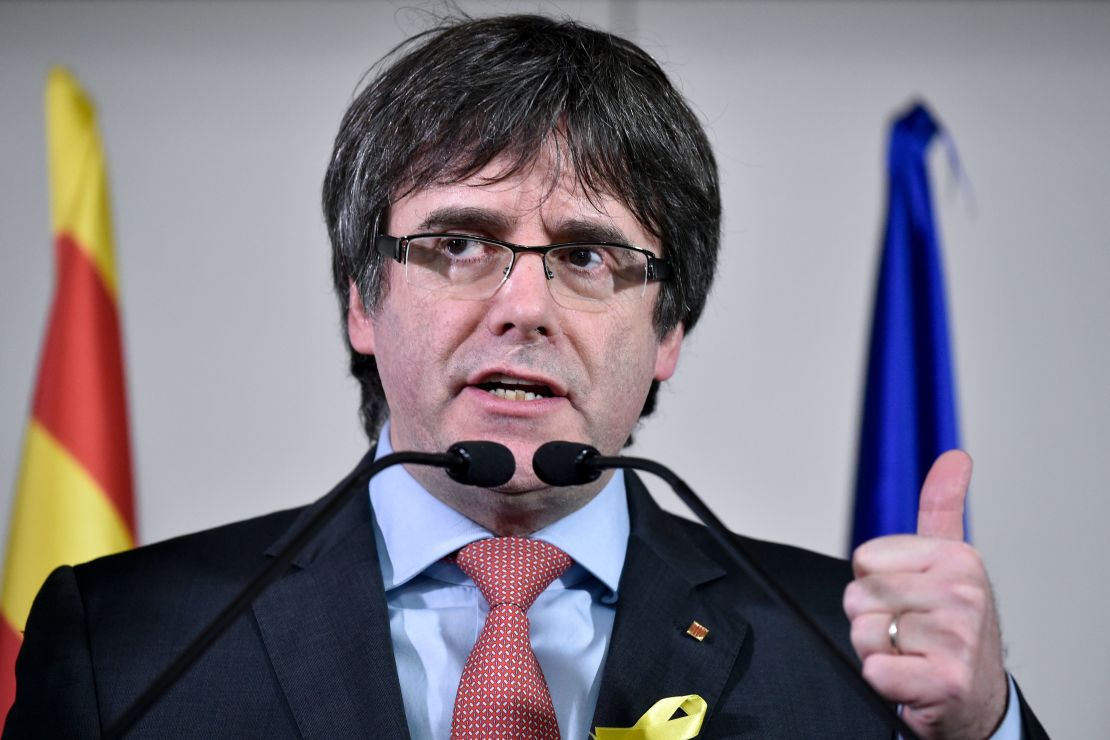Spanish Prime Minister Mariano Rajoy on Friday dismissed a call by former Catalan leader Carles Puigdemont to meet, a day after regional elections gave pro-independence parties a majority in Catalonia’s parliament.
Rajoy remains under pressure after Thursday’s vote made it clear that there is no easy way out of Spain’s worst political crisis in decades.
The former Catalan President said he was seeking an “unconditional” meeting with Rajoy in Europe but not in Spain.
“I would ask for an unconditional meeting. I don’t think we can negotiate just yet,” Puigdemont told a news conference from Brussels, Belgium, where he has been in self-imposed exile since Spanish authorities announced they were seeking his arrest.
“Prime Minister Rajoy has a wonderful opportunity to start siding with the solution seekers and to not create any more problems than he has already created,” he said.

Asked about Puigdemont’s offer, Rajoy brushed it aside, saying the only person he should sit down with was Inés Arrimadas, leader of the pro-unity Ciutadans (Citizens) party.
Ciutadans, known in the rest of spain as Ciudadanos, came first in Thursday’s election. However, its 37 seats are not enough for it to form a majority government.
Analysis: No mood for compromise after close vote
In a blow to Madrid, provisional results showed that three separatist parties together took 70 seats. They needed 68 to keep their grip on the 135-seat Parliament. Between them, they took about 48% of the popular vote.
Rajoy: ‘Deep’ social fracture
The election results show that the region in northeastern Spain is deeply divided, Rajoy told a news conference in Madrid, and will take time to heal.
“Catalonia is not monolithic, it is plural,” Rajoy said. “It is obvious that the social fracture in Catalan society is very deep.”
He called for Catalonia’s lawmakers to find a way to meet the demands of all its people. “What is clear is that no one can speak on behalf of Catalonia if they do not think on behalf of the region,” said Rajoy.
“An election is always a new beginning in democracy, an opportunity to open a new era and I trust in Catalonia we will start an era based on dialogue, not on confrontation.”
The government in Madrid would like to engage in “open, constructive and realist dialogue, always within the framework of the law,” he added.
Rajoy said the results showed a decline in support for pro-independence parties since 2010, although “not as much as we wanted.”
He also commented on the “judicial position” of some of the candidates elected, saying that politicians must be subject to the law.

The Spanish government called the early regional election for Catalonia in the hope of quelling the separatist movement, whose push for independence this year triggered the crisis.
However, that ambition was thwarted when voters backed the three pro-independence parties.
Those parties must now embark on intense negotiations to form a coalition government, with major questions over who might lead it.
Puigdemont – leader of the Junts per Catalunya (Together for Catalonia) faction, which won 34 seats Thursday – said last week that he would come back if he won, but he could still face arrest by Spanish authorities over the illegal referendum if he does.
Meanwhile, the other main separatist leader – Oriol Junqueras of Esquerra Republicana de Catalunya (Republican Left of Catalonia) – is detained in a Madrid prison over the referendum, on charges of sedition and rebellion. Both leaders face 30-year jail terms if convicted.
Investigation widens
Puigdemont was pushed from power after his government held an illegal independence referendum on October 1 and lawmakers unilaterally declared the region’s independence from Spain.
Thursday’s result was a clear rejection of Madrid’s response to the turbulence. Rajoy’s Partido Popular (People’s Party) lost most of its seats in the election, dropping from 11 to three.
The Spanish government sent in thousands of police to shut down the referendum, and officers were seen pulling elderly voters by the hair from polling stations and firing rubber bullets at relatively calm protesters.
Following Catalan lawmakers’ declaration of independence, Madrid dismissed the entire Catalan government and Parliament and seized control of the region.
The Spanish Supreme Court has said it is widening the scope of its investigation into leaders of the Catalan independence movement.
Judge Pablo Llarena is now investigating not only the deposed Catalan government, but also six more officials. Among them are the former Catalan President Artur Mas; Marta Rovira, the secretary general of the Esquerra Republicana; Marta Pascal, the coordinator of Carles Puigdemont’s party; and three others.
CNN’s Angela Dewan, Isa Soares and Amanda Coakley contributed to this report.






